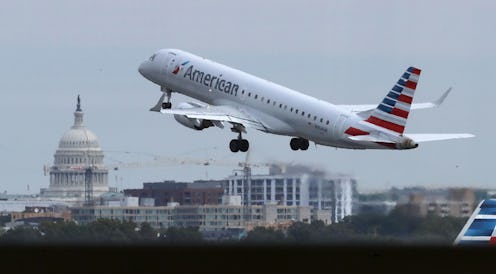Life
Emotional Support Snakes & Goats Are Banned From American Airlines Flights For Safety Concerns

If you know that emotional support and service animals are a thing, you probably think of noble and loving working dogs devoted to helping their humans manage bouts of anxiety, depression, or PTSD — especially while out and about in public, or when traveling via plane. But emotional support animals have come under more scrutiny following different incidents happening on different airlines earlier this spring. Now, TIME reports, American Airlines has updated its emotional support animal policy — and it just so happens that it bans emotional support snakes, rodents, goats, and a slew of other animals that you probably didn't know could actually be emotional support animals.
In a new revision of their previous guidelines for emotional support animals — which go into effect on July 1 — the airline stated, “We support the right of customers, from veterans to people with disabilities, with legitimate needs for a trained service or support animal,” TIME reports. “Unfortunately, untrained animals can lead to safety issues for our team, and customers and working dogs onboard our aircraft.”
According to the Animal Legal and Historical Center at Michigan State University, emotional support animals (ESAs) provide comfort for those suffering from conditions such as panic and anxiety, but aren’t trained like service dogs are to assist with medical conditions. According to Canines for Hope, service animals like PTSD dogs are trained to intervene and assist in a medical crisis by signaling that it’s time to take medication, or stop self-destructive behavior. PTSD dogs are also trained to guide their handler away from stressful or triggering situations. If emotional support and service animals meet certain requirements, they are usually allowed to fly on most airlines for free, CNN Money reports. CNN also reported that the use of emotional support animals has drastically increased in recent years — more than 40 percent between 2016 and 2017 for American Airlines customers.
The Chicago Tribune notes that the new rules are designed with the needs of those with legitimate mental health conditions in mind, and that, according to federal law, airlines are required to allow passengers with disabilities to travel with service and emotional support animals in the cabin — though airlines typically ask for documentation from a mental health professional on behalf of the person traveling to verify the need for the animal onboard the plane. Airlines like American Airlines are cracking down on the emotional support animal verification process as they suspect that some flyers are exploiting the option as a way to avoid the $125 fee required for boarding household pets, the Chicago Tribune further reports.
So anyone wanting to bring their emotional support peacock onboard an American Airlines flight after July 1 will need to double check eligibility per the new standards and restrictions regarding which types of animals are allowed, and which will be banned. You won’t be able to bring your emotional support goat onboard anymore (along with a slew of other newly banned critters), but trained miniature horses are among those who will still be allowed. CNN also notes that, even as travelers flying with ESAs have always had to provide the required documentation before boarding, the airline will now be “stricter about contacting [...] professionals well in advance of flights, in order to verify their notes.” Travelers will also need to sign off on new behavioral requirements for their animals — ESAs will need to be kept on leashes and harnesses throughout the flight, and can be denied boarding or travel if they show any aggressive or concerning behavior, CNN further reported. So basically, travelers will need to sign a written statement saying that their ESA knows how to behave on an airplane. And other than refining the rules for passengers traveling with ESAs, the new restrictions won’t impact those traveling with trained service animals, the Chicago Tribune further notes.